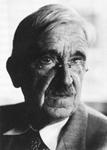Aristotle
Dewey began re-reading Aristotle around 1910 under the influence of his colleague, F. J. E. Woodbridge. Aristotle's notions of habit, and his "empirical" notions of metaphysics and "natural" teleology, shaped Dewey's later thinking.
Georg Wilhelm Friedrich Hegel (d. 1831)
Dewey was an avowed Hegelian early, due to the influence of George Sylvester Morris. Hegel allowed Dewey to unify the real and the ideal, and to combine a Christian reverence with a naturalistic bent. However, Dewey began, around 1892, to replace his Hegelian metaphysics with a more naturalistic metaphysics.
Charles Darwin
Dewey adopted very early Darwin's notion of change as essential to nature. He also gradually accepted Darwin's completely naturalistic theory of evolutionary change, and abandoned the transcendental assumptions of Hegelianism.
William James
James' The Principles of Psychology was one of the most influential books Dewey ever read. James' theory of mind as "the objective, conscious process by which the organism and its environment become integrated," and his view "that organism and environment mutually determine each other, that thinking is simply a function of the interaction between the two, like breathing and walking," became central to Dewey's own views. (Dykhuizen, George, The Life and Mind of John Dewey (Carbondale: SIU Press1973, p. 68)
Early Period, 1879-1892
Explicitly Christian orientation, Hegelian "idealistic" metaphysics, notion of transcendental "absolute" directing nature, ethical notion of "self-realization."
Middle Period, 1892-1924
Gave up Christianity, experimentalist metaphysics, emphasis on scientific method and rationality, ethical goals found in "intrinsic capacities," emphasis on democracy as social good.
Later Period, 1925-1952
Wrote of "common faith" found in experience, naturalistic metaphysics, emphasis on creation of objects in experience, nature as "affair of affairs," "event" as ontological unit, focus on relationships among impulses, habits, and intelligence, importance of direct social action and participation.
